Celebrating a Pioneer of Equitable Mental Health
When 14-year-old Emmett Till was lynched in 1955, it sent shockwaves through the entire African American community. Over 75 years later, the events of that day still gnaw at our nation’s conscience, especially in the face of continued police brutality against unarmed Black civilians like George Floyd. For generations, racially-based trauma has been passed down and through ethnic communities in which mental illness is still taboo. That’s why Bebe Moore Campbell National Minority Mental Health Awareness Month exists–because minority groups have never been given the space to properly process their trauma. They’ve been expected to repress it and move on, which is the opposite of healing. Thanks to mental health champions like Bebe Moore Campbell, minority mental health is finally part of the public discourse. Bebe’s writing was some of the first to shed light on the generational toll of racial trauma. Her 1992 book, Your Blues Ain’t Like Mine, based on the lynching of a fictional stand-in for Emmett Till, explores the ripple effect of his murder on subsequent generations of his family. Her 2003 Children’s book, Sometimes My Mommy Gets Angry, looks at the life of a young girl whose mother struggles with a mental illness. We hope that Bebe’s legacy will inspire you to use your voice, ignite your passion for change and help shape a world where everyone’s mental health matters. To learn more about Bebe Moore Campbell, check out this article article her life and lasting impact.

